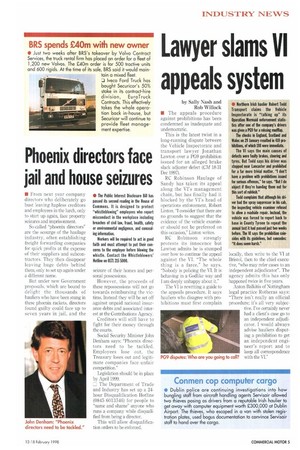Lawyer slams VI appeals system
Page 7

If you've noticed an error in this article please click here to report it so we can fix it.
by Sally Nash and Rob Willock • The appeals procedure against prohibitions has been condemned as inadequate and undemocratic.
This is the latest twist in a long-running dispute between the Vehicle Inspectorate and transport lawyer Jonathan Lawton over a PG9 prohibition issued for an alleged brake slack adjuster defect (CM 18-31 Dec 1997).
RC Robinson Haulage of Sandy has taken its appeal along the VI's management chain, but has finally had h blocked by the VI's head of operations enforcement, Robert Linton. "I consider that there are no grounds to suggest that the evidence of the vehicle examiner should not be preferred on this occasion," Linton writes.
RC Robinson strongly protests its innocence but Lawton admits he is stumped over how to continue the appeal against the VI. "The whole thing is a farce," he says. "Nobody is policing the VI. It is behaving in a Godlike way and lam deeply unhappy about it."
The VI is rewriting a guide to the appeals procedure. It says hauliers who disagree with prohibitions must first complain locally, then write to the VI at
Bristol, then to the chief executive, "who may refer cases to an independent adjudicator". The agency admits this has only happened twice in five years.
Anton Balkitis of Nottingham legal practice Rotheras says: "There isn't really an official procedure: it's all very subjective. I've certainly never had a client's case go to an independent adjudicator. I would always advise hauliers disputing a prohibition to get an independent engineer's report and to keep all correspondence with the VI."
• Northern Irish haulier Robert Todd Transport claims the Vehicle Inspectorate is ''talking up" its Operation Mermaid enforcement statistics after one of the company's drivers was given a PC9 for a missing mudflap.
The checks in England, Scotland and Wales on 29 January resulted in 410 prohibitions, of which 198 were immediate.
The VI says the main causes of defects were faulty brakes, steering and tyres. But Todd says his driver was stopped near Lancaster and prohibited for a far more trivial matter. "I don't have a problem with prohibitions issued for serious offences," he says. "But I do object if they're handing them out for this sort of rubbish."
Todd complains that although his driver had the spray suppressor in his cab, the inspecting vehicle examiner refused to allow a roadside repair. Instead, the vehicle was forced to report back to base in County Tyrone to repeat the annual test it had passed just two weeks before. The VI says the prohibition coincides with its guidelines, hut concedes: "It does seem harsh."




















































































































